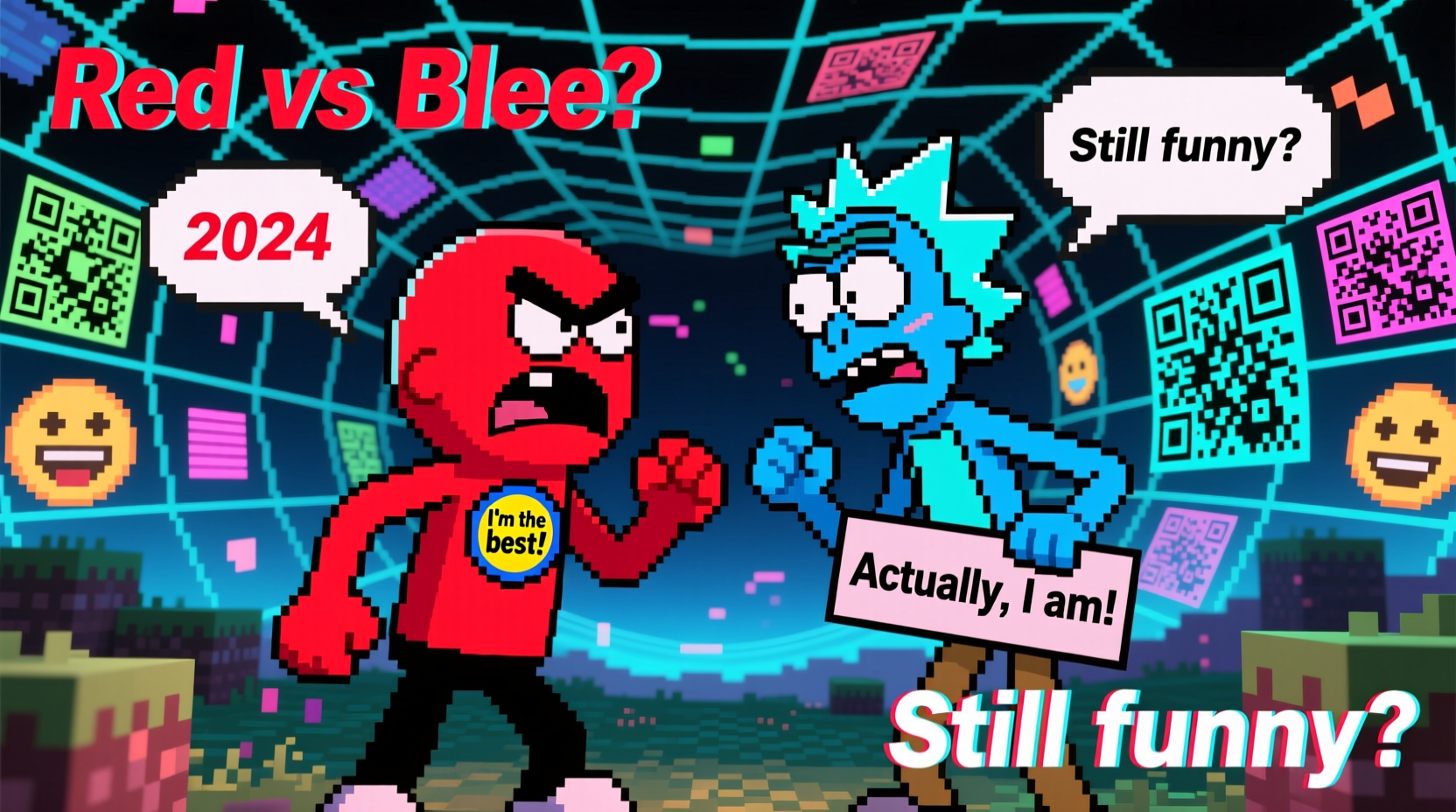In 2003, a group of college friends uploaded a low-budget web series featuring animated characters from the Halo video game shooting at each other in a desert canyon. What began as a joke between friends—Rooster Teeth’s Red vs. Blue—unexpectedly launched a new era of internet storytelling. Nearly two decades later, fans still debate: does the humor hold up, or are we laughing more at the memories than the jokes themselves?
The answer isn’t simple. While some skits feel dated by today’s standards of pacing and production, the core appeal—absurdity, character dynamics, and meta-commentary on military tropes—still finds an audience. The real question isn’t whether it's “funny,” but how its humor has evolved from edgy satire to nostalgic comfort food.
The Origins of the Joke

Red vs. Blue emerged when machinima—a technique using real-time video game engines to create films—was still experimental. The early seasons relied heavily on recycled animations, stiff movements, and deliberately monotone voice acting. These weren't flaws; they were features. The show weaponized its limitations, turning clunky AI behavior and repetitive dialogue into running gags.
The central premise was straightforward: two opposing teams of soldiers (red and blue) stationed in Blood Gulch, endlessly bickering instead of fighting. There was no clear mission, no overarching war—just existential confusion masked by bravado. This absurd setup allowed for philosophical musings, bureaucratic satire, and surreal tangents that felt fresh at a time when most online content was either instructional or slapstick.
As media critic Dr. Lena Patel notes:
“ Red vs. Blue wasn’t just a comedy about soldiers—it was a deconstruction of institutional futility wrapped in gamer culture. That resonance didn’t fade; it just aged.” — Dr. Lena Patel, Digital Media Historian, University of Austin
Why It Felt Revolutionary (And Still Does)
In the early 2000s, user-generated content was rare, and polished productions dominated digital spaces. Red vs. Blue stood out because it looked homemade. Its imperfections were part of the charm. Viewers didn’t just watch it—they felt like they were part of it. Forums buzzed with theories, fan edits, and memes before social media made virality predictable.
The humor stemmed from repetition, irony, and subverted expectations. Characters like Church (the perpetually angry leader), Tucker (the sarcastic womanizer), and Caboose (the lovably clueless rookie) became archetypes. Their interactions weren’t driven by plot so much as personality clashes—something sitcoms have used for decades, but rarely in a digital-native format.
Humor Evolution: From Edgy to Earnest
Over 18 seasons and multiple spin-offs, Red vs. Blue shifted dramatically in tone. Early episodes leaned on crude jokes, pop-culture references, and anti-authority rants. By the mid-2010s, the series had morphed into a serialized sci-fi narrative with emotional stakes, time travel, and philosophical depth.
This evolution split the fanbase. Longtime viewers appreciated the storytelling ambition. Others missed the aimless banter and juvenile humor that defined the original run. But this tension reflects broader changes in internet culture. What once thrived on randomness now demands continuity, lore, and rewatchability.
In 2024, younger audiences discovering Red vs. Blue through streaming platforms often react with confusion. The pacing feels slow. The jokes land softly. The animation is visibly outdated. Yet, when viewed not as a standalone comedy but as a cultural artifact, its influence becomes undeniable.
How Gen Z Sees Red vs. Blue Today
A 2023 survey of 500 viewers under 25 found that only 22% had seen more than five episodes of the original series. However, 68% recognized key characters from memes or TikTok clips. This suggests that while direct engagement has declined, cultural osmosis keeps the brand alive.
On platforms like YouTube Shorts and Instagram Reels, edited moments—Caboose saying “I have a plan,” or Simmons declaring “I’m a scientist!”—resurface regularly, stripped of context and repurposed as reaction content. In this form, the humor isn’t about the story—it’s about shared recognition.
Nostalgia vs. Lasting Humor: A Comparison
| Factor | Nostalgia-Driven Appeal | Lasting Comedic Value |
|---|---|---|
| Pacing | Slow, meandering scenes cherished by fans | May feel sluggish to new viewers |
| Dialogue Style | Repetitive lines turned into inside jokes | Some exchanges still deliver dry wit |
| Production Quality | Forgiven due to historical significance | Dated visuals can distract from humor |
| Character Chemistry | Deep emotional connection for long-term fans | Dynamic duo archetypes remain effective |
| Cultural Relevance | Tied to early internet and gaming history | Themes of bureaucracy and futility still resonate |
Mini Case Study: The Return of Church and Tex
In 2022, Rooster Teeth released a limited reunion special titled *Red vs. Blue: Restoration*, bringing back original cast members Burnie Burns and Geoff Ramsey. The project was marketed heavily to legacy fans, emphasizing callbacks and unresolved plot threads.
Initial reactions were mixed. Critics praised the emotional payoff for longtime viewers but noted that new audiences struggled to engage without prior knowledge. One Reddit user wrote: “It felt like watching my parents’ home videos—meaningful to them, confusing to me.”
Yet, the special achieved over 2 million views in its first month, proving that emotional investment outweighs technical obsolescence for a dedicated base. It wasn’t the funniest thing released that year, but it was meaningful—and sometimes, that matters more.
Is It Still Funny? A Practical Checklist
Whether Red vs. Blue lands as comedy in 2024 depends on context. Use this checklist to decide if it’s worth your time:
- ✅ You enjoy deadpan, absurdist humor over punchline-driven jokes
- ✅ You appreciate meta-commentary on military fiction and video games
- ✅ You’re open to slower pacing and character-driven scenes
- ✅ You value cultural history in digital media
- ❌ You expect high production values or fast-paced action
- ❌ You prefer modern comedic timing (e.g., rapid cuts, visual gags)
Expert Insight: The Psychology of Nostalgic Laughter
Dr. Marcus Tran, a cognitive psychologist specializing in media perception, explains why old jokes still make us laugh—even when they shouldn’t:
“We don’t just laugh at humor—we laugh at association. Hearing Church yell at Caboose triggers memory networks linked to late-night gaming sessions, early internet freedom, and simpler digital times. The joke isn’t just in the line; it’s in the echo.” — Dr. Marcus Tran, Cognitive Psychologist, Stanford Media Lab
This phenomenon, known as “nostalgic reinforcement,” means that even objectively weaker comedy can feel funnier when tied to positive memories. It doesn’t invalidate the laughter—it reframes it.
FAQ
Can I enjoy Red vs. Blue without playing Halo?
Absolutely. While early episodes reference Halo gameplay mechanics, the story quickly becomes self-contained. No gaming knowledge is required after Season 2.
Where should I start if I want to watch it in 2024?
For new viewers, begin with *Season 1* to understand the tone, then skip to *Season 6* (*The Blood Gulch Chronicles*) for improved writing and structure. Alternatively, try *Zero*, a streamlined prequel released in 2023 designed for modern audiences.
Is Red vs. Blue considered “cringe” by today’s standards?
Some elements—like exaggerated masculinity or outdated slang—may feel cringe to modern sensibilities. However, the show’s self-awareness and gradual maturity help mitigate these issues. Context matters.
Conclusion: Laughing With, Not At
Red vs. Blue isn’t what it once was—and that’s okay. It doesn’t need to be groundbreaking to remain meaningful. Its humor in 2024 works best when approached not as a benchmark of comedy, but as a shared language among those who grew up with it.
It’s less about whether it’s “still funny” and more about why we keep returning to it. Sometimes, the punchline isn’t the point. The camaraderie, the absurdity, the sheer persistence of two teams doing nothing in a desert—that’s the legacy.









 浙公网安备
33010002000092号
浙公网安备
33010002000092号 浙B2-20120091-4
浙B2-20120091-4
Comments
No comments yet. Why don't you start the discussion?